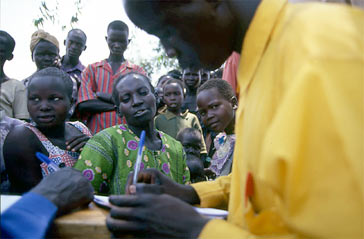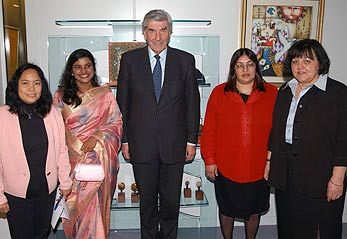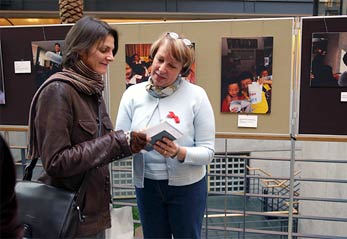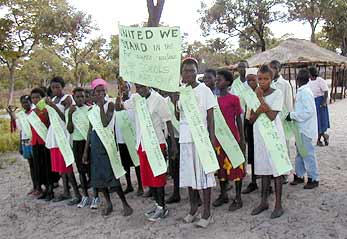UNHCR welcomes constitutional changes extending Albanian's rights in the Former Yugoslav Republic of Macedonia
UNHCR welcomes constitutional changes extending Albanian's rights in the Former Yugoslav Republic of Macedonia

SKOPJE, Nov. 16 (UNHCR) - The United Nations High Commissioner for Refugees expressed satisfaction Friday at "the long awaited adoption" of constitutional amendments increasing the rights of the Albanian ethnic-minority in the Former Yugoslav Republic of Macedonia (FYROM). But it said the move should be followed by quick implementation of the August peace accord.
"Now that FYROM has incorporated minority rights in its national legislation, we would like to see this implemented on the ground," UNHCR spokesman Ron Redmond told a news briefing in Geneva. "A major first step towards doing that would be the actual implementation of an amnesty."
He said any amnesty should apply not only to former Albanian rebels but also to draft evaders and deserters of all ethnic communities who refused to fight during the six-months of civil strife earlier this year.
"A generous amnesty will make for the smooth introduction of a multi-ethnic police force into the former conflict areas and will help reduce fear among people of all communities," Redmond added.
The constitutional amendments, adopted by a large majority during an all-night session of Parliament, make Albanian the FYROM's second language. The changes also give the ethnic Albanian minority a voice in parliament and other public bodies and guarantee their political, religious, and cultural rights.
The action by Parliament came just one day after High Commissioner Ruud Lubbers warned of further population displacement in the country unless significant progress is immediately made in implementing the August 13 peace agreement. That accord called for an end to the six months of fighting, the collection by NATO of rebel arms, and the enactment by Parliament of measures granting more rights to the ethnic Albanians.
"[The former Yugoslav Republic of] Macedonia is heading dangerously close to a turning point," Lubbers said Thursday during a visit to New York. "There must be no further delays in the political peace process, particularly on the amnesty issue, if the country is to avert further displacement of its people."
He expressed serious concern over the outburst of violence last weekend near the FYROM town of Tetovo, prompting thousands of villagers to flee their homes.
"UNHCR has been working for months assisting the returnees and villagers in conflict-affected areas, helping to build confidence between communities," Lubbers added. "But it is high time for the government to make significant progress before people finally lose hope and extremists on both sides take up arms again, undermining all the peace efforts achieved thus far."
At its height, the conflict in FYROM led more than 100,000 people to flee the country, with another 70,000 internally displaced. Over 62,000 of the refugees have returned from Kosovo. But the estimated 16,000 refugees who remain in Kosovo have been fearful of returning to their homes until the promised amnesty law is implemented, and returns during the past several weeks have slowed to a trickle.
In an effort to ease tensions and increase communications between the various ethnic communities, UNHCR this week added three new bus routes to the six already operating in the Skopje and Kumanovo areas. The buses transport students and workers and will be operated by the refugee agency until commercial buses can resume normal operations.
The agency is delivering 20 truckloads of shelter material daily to help families repair homes damaged by the conflict. In addition, UNHCR staff members have visited 85 of the 102 villages in the former areas of conflict, and the agency is currently looking for ways to send aid to families who have returned to other villages that are now inaccessible due to security problems.
Without an effective amnesty, however, tensions continue to rise. The latest problems occurred last weekend when government forces and former ethnic Albanian rebels clashed in the village of Trebos, near Tetovo. Three policemen were killed in the action, which also saw the arrest of seven Albanians. Fearing further violence, some 1,000 people were reported to have fled Ljuboten, north of Skopje.
"UNHCR will continue to help stabilise [the former Yugoslav Republic of] Macedonia, assisting the displaced population and returnees of all communities," said Amin Awad, UNHCR's head of operations in FYROM. "But humanitarian aid alone cannot sustain peace. I sincerely hope the Parliament will finally pass the peace package and send a positive signal to the people."





